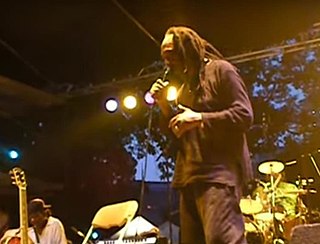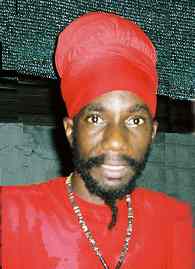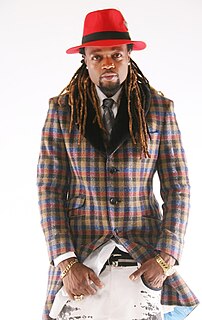
John Lee Hooker was an American blues singer, songwriter, and guitarist. The son of a sharecropper, he rose to prominence performing an electric guitar-style adaptation of Delta blues. Hooker often incorporated other elements, including talking blues and early North Mississippi Hill country blues. He developed his own driving-rhythm boogie style, distinct from the 1930s–1940s piano-derived boogie-woogie. Hooker was ranked 35 in Rolling Stone's 2015 list of 100 greatest guitarists.

Paul Frederic Simon is an American musician, singer, songwriter and actor. Simon's musical career has spanned over six decades. He is widely regarded as one of the best songwriters in popular music history.

Zimbabwean music is heavily reliant on the use of instruments such as the mbira, Ngoma drums and hosho. Their music symbolizes much more than a simple rhythm, as the folk and pop style styled music was used as a symbol of hope for Zimbabweans looking to gain independence from Rhodesia. Music has played a significant role in the history of Zimbabwe, from a vital role in the traditional Bira ceremony used to call on ancestral spirits, to protest songs during the struggle for independence. The community in Zimbabwe used music as a tool to voice their oppression when they didn't have the weapons to fight back. However, they fought to keep their traditions and ancestors with them through musical representation. Music has the power to influence how people behave, especially to the lives of the Zimbabwe. Music represents so much more than a melody and to the Zimbabwe, music is a key element to their modern culture.

Thomas Tafirenyika Mapfumo is a musician nicknamed "The Lion of Zimbabwe" and "Mukanya" for his immense popularity and for the political influence he wields through his music, including his sharp criticism of the government of former Zimbabwean president Robert Mugabe. He both created and made popular Chimurenga music, and his slow-moving style and distinctive voice is instantly recognisable to Zimbabweans.

Miguel Orlando Collins, known by his stage name Sizzla Kalonji or Sizzla, is a Jamaican reggae recording artist. He is one of the most commercially and critically successful contemporary reggae artists and is noted for his high number of releases. As of 2018 he has released 56 solo albums.

Paul Joseph Brady is an Irish singer-songwriter and musician from Strabane, Northern Ireland. His work straddles folk and pop. He was interested in a wide variety of music from an early age. He initially collaborated with several major bands, prior to launching a successful solo career.
"La Bamba" is a Mexican folk song, originally from the state of Veracruz, best known from a 1958 adaptation by Ritchie Valens, a top 40 hit in the U.S. charts and one of early rock and roll's best-known songs. Valens' version of "La Bamba" is included in Robert Christgau's "Basic Record Library" of 1950s and 1960s recordings — published in Christgau's Record Guide: Rock Albums of the Seventies (1981) — and ranked number 345 on Rolling Stone magazine′s list of the 500 Greatest Songs of All Time. It is the only song on the list sung in a language other than English.

Oliver "Tuku" Mtukudzi was a Zimbabwean musician, businessman, philanthropist, human rights activist and UNICEF Goodwill Ambassador for Southern Africa Region. Tuku was considered to have been Zimbabwe's most renowned and internationally recognised cultural icon of all time.
Zimbabwean hip hop emerged in the early 1990s and is still present and evolving. The genre is known for its association with the lower middle class to upper-class youth in Zimbabwe, with Trap Music being the most popular sub-genre.
Ephat Mujuru (1950–2001), was a Zimbabwean musician, one of the 20th century's finest players of the mbira, a traditional instrument of the Shona ethnic group of Zimbabwe.

Louis Mhlanga is a Zimbabwean artist based in South Africa, an award-winning guitarist and producer. Mhlanga taught himself to play the guitar at a young age and is considered one of the best Southern African guitarists.
Funuel Nyasha Tazvida, best known as System Tazvida, was a Zimbabwean musician born on 2 May 1968 in Zaka Masvingo during the Rhodesia era the modern day Zimbabwe. Very popular in his home country mainly in the 1990s, though not as well known internationally. System Tazvidas music was sang more in a satirical manner but was very pregnant with meaning and was more of a social commentator on various issues that affect people in their day to day living. Tazvida wrote and performed songs mainly in his native Shona language.
Jean-Marc Monnerville, better known by his stage name Kali, is a French musician from Martinique known for his contributions to Modern Zouk, banjo playing and his work with the Eurovision Song Contest. He is further notable for his often controversial, politically-charged lyrics comment on imperialism, slavery and military proliferation.
R.U.N.N. Family were a Zimbabwean musical group that had several hits in the 1980s, whose songs combined mbira-inspired music with reggae and rhumba influences.
Tongai Moyo was a contemporary Zimbabwean musician, often referred to as Dhewa. Born and raised in Kwekwe, Dhewa rose to fame in the late 1990s as a solo artist and with the band Utakataka Express. Highly successful singles including "Samanyemba", "Naye", and "Muchina Muhombe" led to his national, regional and international fame; he produced 14 albums in a career of over twenty years.
Zimdancehall is a subgenre of reggae/dancehall music from Zimbabwe.

Mukudzeyi Mukombe, who performs under the stage name Jah Prayzah, is a Zimbabwean contemporary musician and lead member of the band Third Generation. He is popularly referred to by fans and media as "Musoja", the Shona word for "soldier", a name he earned mostly because of his signature band uniform of military regalia. The name "Jah Prayzah" comes from his name, "Mukudzeyi", which means "Praise Him". Mukomana murefu iyeyi.
Culture Spears is a Tswana traditional music group based in Botswana. It is also a traditional dance group.

Buffalo Souljah is a South Africa-based Zimbabwean 10 time African Channel O,Soundcity,Zima reggae dancehall award winning reggae recording artist and songwriter. He owns the record label U.N.A.









